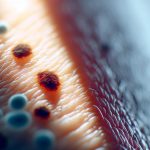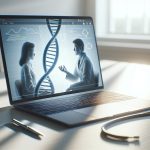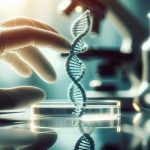DenaDNA is a creative online platform that makes the complex world of genetics easy and engaging, thanks to its founder, Dena Goldberg. She’s not only a savvy businesswoman but also a genetic counselor who passionately shares why every healthcare team can benefit from having an expert like her onboard.
The Origin and Development of DenaDNA: A Brief Overview
Holding a board certification in genetic counseling, my journey began with experience in various laboratories which propelled me to pursue further education. Achieving a master’s degree in this field marked a turning point, steering me towards specializing in cancer genetics at the prestigious University of California, San Francisco for four fruitful years.
In the midst of academic rigors, I birthed Dena DNA during my graduate studies. What started as comic strips illustrating the nuances of genetic counseling captured significant attention online. This recognition awakened me to the power of personal branding and led to a successfully funded crowdfunding initiative supporting my thesis research. As time went on, multiple viral social media campaigns helped cement Dena DNA as a household name among both genetic counselors and enthusiasts alike.
At Dena DNA, I marry creativity with scientific rigor to demystify genetics through engaging content. A pivotal move came when an opportunity for entrepreneurship beckoned following my husband’s career shift to Los Angeles at 2019’s close, compelling me to dedicate myself entirely to Dena DNA.
Currently, I’m committed to producing content that corrects misconceptions about genetics frequently propagated by mainstream media. By employing innovative communication strategies previously unexplored by the medical community, I aim not only to educate but also empower individuals with knowledge about accessible genetic services often overlooked.
Additionally, an exciting collaboration with an Academy Award-winning producer is underway. We’re gearing up for fundraising efforts aimed at bringing a documentary TV pilot centered around genetics into fruition. Hopes are high that this project will ultimately evolve into a television series under my stewardship.
One recent endeavor includes a video where I break down Genetic Sequencing versus SNP testing – showcasing our commitment to making complex concepts approachable and understandable for all.
What can individuals learn by speaking with a genetic counselor?
In the vast landscape of our healthcare framework, genetic counselors play a pivotal role. These professionals, who are mandated to hold board certification, delve into various specialized domains, including but not limited to prenatal matters, pediatric care, cancer genetics, and heart-related genetic issues among others. Their expertise is crucial in navigating the complex terrain of genetic testing.
A key step to identifying the most fitting genetic test for an individual involves a comprehensive review of their personal and familial health backgrounds. This process is more than just ticking boxes; it’s about weaving together a narrative that highlights potential genetic risks unique to the person in question.
Furthermore, understanding an individual’s motives behind seeking genetic testing is equally important. It’s not as straightforward as picking a test off a shelf; it’s about aligning with the specific concerns or conditions they’re wary of. The sheer diversity in tests available means that tailoring this choice becomes both an art and science – focusing on what truly matters to the patient.
With advancements in technology enabling us to peek into our genetic blueprint with increasing precision, choosing the right approach hinges on these detailed discussions and evaluations. By pinpointing exactly what worries a patient or what they’re at risk for allows for not just targeted testing but also crafting personalized medical strategies aimed at mitigating those risks or preventing potential diseases from taking root.
In essence, this journey through genetics isn’t just about finding out what lies within our DNA. It’s about empowering individuals with knowledge tailored specifically for them – guiding them towards healthier futures armed with insights drawn from their very essence.
How genetic counseling helps doctors and healthcare providers make better decisions
Within the healthcare realm, genetic counselors play a crucial role by closely collaborating with patients and their physicians. They delve into one’s genetic makeup to tailor testing and treatment strategies that align perfectly with individual needs. This approach is especially pivotal in managing cancer, where prevention takes center stage through proactive screening measures.
Imagine someone at an elevated risk for colon cancer. Here, the advice would lean towards more regular and earlier colonoscopy screenings. The rationale? Catching polyps early on prevents them from evolving into cancer. And for those already battling cancer, genetic insights can fine-tune treatment plans and even signal the need for family members to undergo early screenings.
Moreover, when it comes to fighting cancer, not all treatments are equal across the board. Certain inherited syndromes make patients more receptive to specific therapies. Without knowledge of such syndromes, patients might only receive standard care which may fall short in effectiveness. Hence, genetic counseling isn’t just beneficial; it’s transformative, customizing both preventive measures and treatments to fit like a glove.
Understanding the Effects of Genetic Bias on Individuals

Using someone’s genetic data to unfairly treat them, like hiking up their insurance fees, refusing coverage, or making job-related decisions such as hiring, firing, or promotions is known as genetic discrimination. The fear of facing such discrimination often deters individuals from getting genetic tests done. It’s crucial to understand that in the United States, laws are in place to shield people from this type of prejudice. These regulations prevent health insurers and employers from misusing genetic information. Spreading awareness about these legal protections forms a significant part of my responsibilities.
What current trends and technologies interest you the most?
Exploring the realm of tumor testing opens up a world of possibilities, especially with the advent of cell-free DNA testing. This technique taps into the bloodstream to scout for DNA fragments shed by tumors, offering a non-invasive method to detect cancer. It’s equally fascinating how this approach extends to prenatal care, allowing doctors to glean insights about an unborn child’s health through fetal DNA found in the mother’s blood.
The field of pharmacogenetics stands out as another frontier brimming with potential. It delves into our genetic makeup to predict which medications will work best for individual patients. Although still evolving, its growth spurt signals a future where personalized medicine becomes the norm rather than the exception. This could revolutionize how medical professionals devise treatment plans, ensuring they are tailored precisely to meet each patient’s unique needs.
On another note, psychiatric genetics is carving its niche as an intriguing and complex area of study. Mental health disorders present a labyrinthine challenge due to their intricate nature compared to other conditions. Yet, leveraging genetics offers a beacon of hope in understanding and treating these issues more effectively. The promise it holds for advancing mental health care is undeniably significant.
Collectively, these breakthroughs underscore an exciting era in medical science where understanding our genetic blueprint could unlock unprecedented avenues for diagnosis and treatment across various fields. As we continue down this path, the anticipation builds for what lies ahead in harnessing genetics’ full potential for enhancing human health and well-being.
How do you see genetic testing and counseling becoming common in healthcare?
Genetics stands as the backbone of future medical advancements, shaping how we understand and treat various conditions that affect our bodies. Surprisingly, many physicians lack extensive training in genetics, a gap more noticeable for those who completed their education over five years ago, before the advent of today’s sophisticated technologies.
The field of genetics is dynamic, with new discoveries unfolding daily. This underscores the necessity for healthcare teams to include specialists dedicated solely to genetics. These professionals play a crucial role in deciphering genetic tests and integrating these findings into personalized treatment plans.
A pivotal aspect of advancing genetic medicine involves incorporating genetic counselors into every healthcare team. Unlike simple testing, genetic counseling marries analysis with guidance, addressing not only the patient but also potentially affected family members. Genetic counselors are adept at navigating complex family dynamics and psychological aspects related to genetic conditions.
Furthermore, genetic counselors serve as invaluable safeguards against unnecessary or inappropriate testing – an issue all too common when non-specialists venture into this intricate domain without proper guidance. Errors in test selection can lead not only to unwarranted financial burdens for patients but also to severe medical oversights, such as unneeded surgeries or missed opportunities for life-saving interventions.
In summing up hopes for the future of genetic medicine, it becomes clear that integrating knowledgeable professionals who can adeptly manage test selection and interpretation will benefit both individuals and the broader healthcare system immensely. Through their expertise, we can avoid costly mistakes and ensure that patients receive care that’s both effective and tailored specifically to their genetic makeup.
Making Genetics Easy to Understand for Beginners
Through my experience as a genetic counselor, I’ve honed the skill of simplifying complex concepts for those who might not have a scientific background. The essence of my training was rooted in the ability to communicate effectively with a diverse audience, ensuring that information is accessible regardless of one’s educational foundation. Over the years, I’ve discovered that visual aids significantly enhance understanding. It’s clear to me that people grasp ideas more readily when they can see and hear explanations simultaneously.
To bridge this gap, I’ve leveraged my talents in illustration, graphic design, and animation to transform intricate subjects into engaging visuals. This approach proves especially useful for individuals whose attention might wander or who are new to the science at hand. My goal has always been to make learning both enjoyable and straightforward.
For those eager to dive deeper into these topics, I’ve created content across various platforms including Instagram, YouTube, TickTock, and Facebook. These videos employ imaginative methods to demystify genetics for the average person. To discover more about this fascinating field and how it’s presented in an easily digestible format, visiting my website will provide a wealth of resources aimed at enlightening and intriguing any curious mind.



















